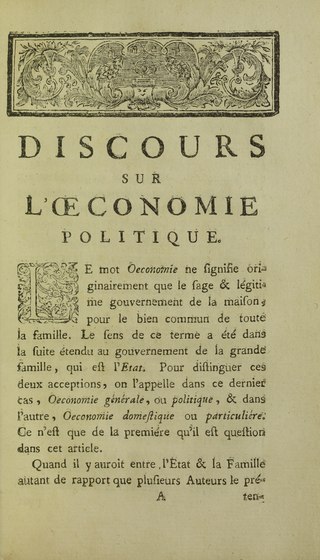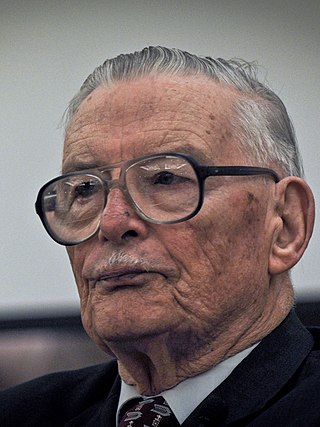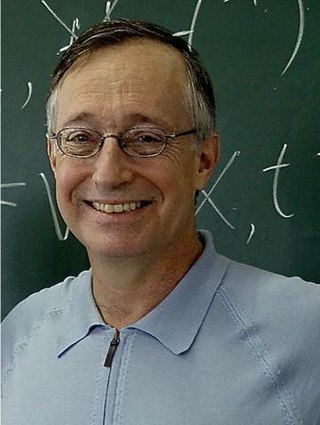
Political economy is a branch of political science and economics studying economic systems and their governance by political systems. Widely studied phenomena within the discipline are systems such as labour markets and financial markets, as well as phenomena such as growth, distribution, inequality, and trade, and how these are shaped by institutions, laws, and government policy. Originating in the 16th century, it is the precursor to the modern discipline of economics. Political economy in its modern form is considered an interdisciplinary field, drawing on theory from both political science and modern economics.

Kenneth Joseph Arrow was an American economist, mathematician, writer, and political theorist. He was the joint winner of the Nobel Memorial Prize in Economic Sciences with John Hicks in 1972.

James McGill Buchanan Jr. was an American economist known for his work on public choice theory originally outlined in his most famous work, The Calculus of Consent, co-authored with Gordon Tullock in 1962. He continued to develop the theory, eventually receiving the Nobel Memorial Prize in Economic Sciences in 1986. Buchanan's work initiated research on how politicians' and bureaucrats' self-interest, utility maximization, and other non-wealth-maximizing considerations affect their decision-making. He was a member of the Board of Advisors of The Independent Institute as well as of the Institute of Economic Affairs, a member of the Mont Pelerin Society (MPS) and MPS president from 1984 to 1986, a Distinguished Senior Fellow of the Cato Institute, and professor at George Mason University.

The Hoover Institution is an American public policy think tank and research institution that promotes personal and economic liberty, free enterprise, and limited government. While the institution is formally a unit of Stanford University, it maintains an independent board of overseers and relies on its own income and donations. Fellowship appointments do not require the approval of Stanford tenure committees. It is widely described as a conservative institution, although its directors have contested its partisanship.

Douglass Cecil North was an American economist known for his work in economic history. He was the co-recipient of the 1993 Nobel Memorial Prize in Economic Sciences. In the words of the Nobel Committee, North and Fogel "renewed research in economic history by applying economic theory and quantitative methods in order to explain economic and institutional change."

Paul Robert Milgrom is an American economist. He is the Shirley and Leonard Ely Professor of Humanities and Sciences at the Stanford University School of Humanities and Sciences, a position he has held since 1987. He is a professor in the Stanford School of Engineering as well and a Senior Fellow at the Stanford Institute for Economic Research. Milgrom is an expert in game theory, specifically auction theory and pricing strategies. He is the winner of the 2020 Nobel Memorial Prize in Economic Sciences, together with Robert B. Wilson, "for improvements to auction theory and inventions of new auction formats".
Robert Hinrichs Bates is an American political scientist specializing in comparative politics. He is Eaton Professor of the Science of Government in the Departments of Government and African and African American Studies at Harvard University. From 2000–2012, he served as Professeur associé, School of Economics, University of Toulouse.
New Institutional Economics (NIE) is an economic perspective that attempts to extend economics by focusing on the institutions that underlie economic activity and with analysis beyond earlier institutional economics and neoclassical economics. Unlike neoclassical economics, it also considers the role of culture and classical political economy in economic development.
The Virginia School of political economy is a school of economic thought originating at the Thomas Jefferson Center for Studies in Political Economy of the University of Virginia in the 1950s and 1960s. Some of its proponents established the Center for Study of Public Choice at Virginia Tech in 1969, moving it to George Mason University in 1983. The school focuses primarily on public choice theory, constitutional economics, and law and economics.

Margaret Levi is an American political scientist and author, noted for her work in comparative political economy, labor politics, and democratic theory, notably on the origins and effects of trustworthy government.
Market-preserving federalism is a special type of federalism that limits the degree to which a country's political system can encroach upon its markets. Weingast notes that there is a fundamental dilemma facing a government attempting to build and protect markets: the government must be strong enough to protect property rights and enforce contracts, but weak enough to credibly commit the state to honoring such rules.

Daniel W. Bromley is an economist, the former Anderson-Bascom Professor of applied economics at the University of Wisconsin–Madison, and since 2009, Emeritus Professor. His research in institutional economics explains the foundations of property rights, natural resources and the environment; and economic development. He has been editor of the journal Land Economics since 1974.
Constitutional economics is a research program in economics and constitutionalism that has been described as explaining the choice "of alternative sets of legal-institutional-constitutional rules that constrain the choices and activities of economic and political agents". This extends beyond the definition of "the economic analysis of constitutional law" and is distinct from explaining the choices of economic and political agents within those rules, a subject of orthodox economics. Instead, constitutional economics takes into account the impacts of political economic decisions as opposed to limiting its analysis to economic relationships as functions of the dynamics of distribution of marketable goods and services.
Masahiko Aoki was a Japanese economist, Tomoye and Henri Takahashi Professor Emeritus of Japanese Studies in the Economics Department, and Senior Fellow of the Stanford Institute for Economic Policy Research and Freeman Spogli Institute for International Studies at Stanford University. Aoki was known for his work in comparative institutional analysis, corporate governance, the theory of the firm, and comparative East Asian development.
Thomas Earl Borcherding was an American economist. His areas of specialization include microeconomics, public choice, property rights, exchange and transaction costs, politics and public choice, sociological economics, and the role of institutions in economic, political, and social choice.
The Financial Revolution was a set of economic and financial reforms in Britain after the Glorious Revolution in 1688 when William III invaded England. The reforms were based in part on Dutch economic and financial innovations that were brought to England by William III. New institutions were created: a public debt and the Bank of England (1694). Soon thereafter, English joint-stock companies began going public. A central aspect of the financial revolution was the emergence of a stock market.
Gillian Kereldena Hadfield is a professor of law and of strategic management who is the inaugural Schwartz Reisman Chair in Technology and Society at the University of Toronto Faculty of Law. She is also director of the Schwartz Reisman Institute for Technology and Society. Previously, she was the Richard L. and Antoinette Schamoi Kirtland Professor of Law and Professor of Economics at the University of Southern California. At USC, Hadfield directed the Southern California Innovation Project and the USC Center in Law, Economics, and Organization. She is a former member of the board of directors for the American Law and Economics Association and the International Society for New Institutional Economics.

Daniel Diermeier is a German-American political scientist and university administrator. He is serving as the ninth Chancellor of Vanderbilt University. Previously, Diermeier was the David Lee Shillinglaw Distinguished Service Professor at the University of Chicago, where he also served as Provost. He succeeded Eric Isaacs on July 1, 2016, and was succeeded by Ka Yee Christina Lee on February 1, 2020.
Gary Don Libecap is a Distinguished Professor of Corporate Environmental Management at the Bren School of Environmental Science & Management and Distinguished Professor of Economics at the University of California Santa Barbara. Libecap is a research associate at the National Bureau of Economic Research; a research fellow at the Hoover Institution; and a senior fellow at the Property and Environment Research Center, and a member of the Research Group on Political Institutions and Economic Policy, Harvard University. He was the Pitt Professor of American History and Institutions at Cambridge University 2010-11, and was previously the Anheuser Busch Professor of Entrepreneurial Studies, Economics, and Law at the University of Arizona.
Donald Jasper Harris is a Jamaican-American economist and professor emeritus at Stanford University, known for applying post-Keynesian ideas to development economics. He is the father of the 49th and current vice president of the United States, Kamala Harris, as well as of her sister, lawyer and political commentator Maya Harris.









